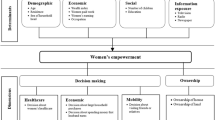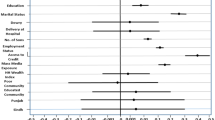Abstract
The issue of decision-making ability is paramount to women’s empowerment. The current study intends to examine the role of women’s autonomy in decision-making by considering the resources that needed to demolish the restrictions at various levels including cultural and institutional. To highlight the influence of the decision-making process among women based on gender power relationships, various programs, researches, and policy debates have been commenced. This study examined the decision-making ability among the rural women of southern Punjab as a source of their empowerment. A cross-sectional survey design using quantitative techniques was employed. A multistage cluster sampling technique was adopted to generate information. Total twenty-four villages from three divisions of southern Punjab (Bahawalpur, Multan, D.G. Khan) and 600 women were selected as respondents. Data were analyzed using descriptive statistics, that is, frequencies and percentages. The principle component analysis was used to validate the items of each variable. The findings revealed that out of the six decision-making variables considered in the paper, the respondents were found to have low decision-making ability in the studied area. The paper concluded that rural women have a relatively lower level of decision-making ability on issues concerning them, their household and the society at large.
Similar content being viewed by others
References
Abrar-ul-haq, M., Jali, M. R. M., & Islam, G. M. N. (2017). Empowering rural women in Pakistan: empirical evidence from Southern Punjab. Quality & Quantity, 51(4), 1777–1787.
Abrar-ul-haq, M., Jali, R. M., & Islam, G. N. (2016). Measuring the socio-economic empowerment of rural households in Pakistan. Journal of Governance and Development, 12(1), 107–122 Retrieved from http://jgd.uum.edu.my/index.php/96-abstract/349-abstract-7-vol-12-issue-1.
Anand, S. (1994). Population, well-being and freedom. In G. Sen, A. Germain, & L. C. Chen (Eds.), Population policies reconsidered: health empowerment and rights. Massachusetts: Harvard School of Public Health.
Chen, M. Y. (1992). Argument vs. adjunct: Xiamen tone sandhi revisited. Ms., San Diego: University of California.
Dyson, T., & Moore, M. (1983). On kinship structure, female autonomy, and demographic behavior in India. Population and development review, 35–60.
Eguavoen, A. N., Odiagbe, S. O., & Obetoh, G. I. (2007). The status of women, sex preference, decision making and fertility control in Ekpoma community of Nigeria. Journal of Social Science, 15(1), 43–49.
Isiugo-Abanihe, U. C. (1994a). Nuptiality patterns, sexual activities and fertility in Nigeria. DHS working Papers Number 16.
Kabeer, N., Mahmud, S., & Tasneem, S. (2011). Does paid work provide a pathway to women's empowerment? Empirical findings from Bangladesh.
Keller, B., & Mbewe, D. C. (1991). Policy and planning for the empowerment of Zambia's women farmers. Canadian Journal of Development Studies/Revue canadienne d'études du développement, 12(1), 75–88.
Kishor, S., & Lekha, S. (2008). Understanding women’s empowerment: a comparative analysis of demographic and health surveys (DHS) data. DHS comparative reports no. 20. Calverton: Macro International Inc..
Krejcie, R. V., & Morgan, D. W. (1970). Determining sample size for research activities. Educ psychol meas.
Mahmud, S. (1993). Female power: a key variable in understanding the relationship between women’s work and fertility. Dhaka: Bangladesh Institute of Development Studies Unpublished Manuscripts.
Mahmud, S., & Johnson, A. M. (1994). Women’s status, empowerment and reproductive outcomes. In G. Sen, A. Germain, & L. C. Chen (Eds.), Population policies reconsidered: health empowerment and rights. Massachusetts: Harvard School of Public Health.
Nayak, P. & Mahanta, B. (2008). Women empowerment in India. http://papers.ssrn.com/sol3/papers.cfm?abstract_id=1320071.
Nussbaum, M. (2000). Women’s capabilities and social justice. J Hum Dev, 1(2), 15–36 Oxford University Press.
Reeves, H. & Baden, S. (2000). Gender and development: concepts and definitions. BRIDGE Development-Gender Report No. 55.
Rowlands, J. (1995). Empowerment examined. Development in Practice, 5(2), 101–107.
Safilios-Rothschild, C. (1982). Female power, autonomy and demographic change in the third.
Sen, A. K. (1993). Capability and well-being. In C. N. Martha & A. K. Sen (Eds.), The quality of life (pp. 30–53). Oxford: Clarendon Press.
Sen, A. (1999). Woman’s agency and social change. In A. Sen (Ed.), Development as freedom (pp. 189–203). New York: Oxford University Press Townsend, Janet. Zapata, Emma.
Sen, S., & Batliwala, S. (2000). Empowering women for reproductive rights. In H. B. Presser & G. Sen (Eds.), Women’s empowerment and demographic processes. New York: New York.
Sharma, K. (1991-1992). Grassroots organizations and women’s empowerment: some issues in the contemporary debate. Sanya-Shakti, 6, 28–43.
United Nations. (2009). The millennium development goals report 2009 (pp. 1–52, Rep). United Nations Publications.
Upadhyay, U. D. & Karasek, D. (2010). Women’s empowerment and achievement of desired fertility in Sub-Saharan Africa. DHS Working Papers No. 80. Calverton: ICF Macro.
World Bank. (2001). Engendering development: Through gender equality in rights, Resources and voice. World. In R.
Author information
Authors and Affiliations
Corresponding author
Ethics declarations
Conflict of Interest
The authors declare that they have no conflict of interest.
Rights and permissions
About this article
Cite this article
Abrar-ul-haq, M., Jali, M.R.M. & Islam, G.M.N. Decision-Making Ability as a Source of Empowerment Among Rural Women of Pakistan. Glob Soc Welf 4, 117–125 (2017). https://doi.org/10.1007/s40609-017-0091-7
Published:
Issue Date:
DOI: https://doi.org/10.1007/s40609-017-0091-7




